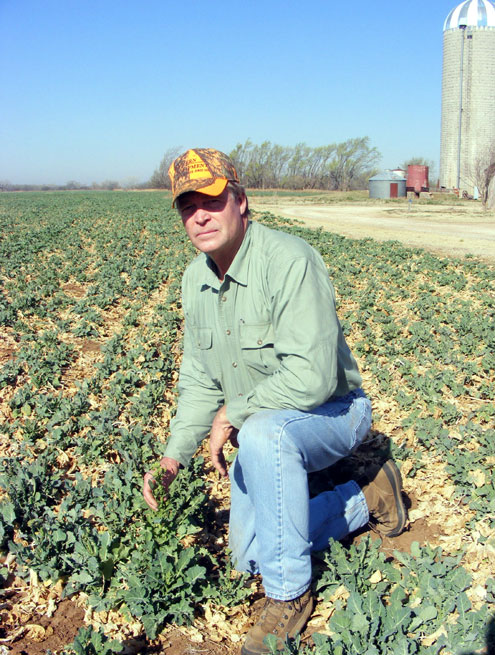Vici, Oklahoma -- Jerry Hedges is a fourth-generation farmer in northwest Oklahoma and he urges plains wheat growers to place winter canola in rotation with their continuously cropped winter wheat.
"There are a lot of problems with growing winter wheat in this area," the Vici, Oklahoma producer said. "Growing wheat year after year for several decades has created serious wheat disease problems. We are also fighting an increasing weed problem."
Winter canola, a winter crop farmers can plant and harvest with the same equipment used growing wheat, offers several advantages for farmers to consider, Hedges said.
"I was one of the first farmers around here to plant canola," he said. "Five years ago, I planted my first canola crop. Winter canola grows well in the southern plains states. It grows well in dry weather. Prices paid for the harvested seed exceed prices paid for wheat. It works well in no-till and minimum tillage progrms and if you plant it following wheat, it does wonders to reduce weed populations commonly found in continuously grown wheat."
A member of the Plains Oilseed Products grower cooperative that promotes production of canola and other oilseed crops, Hedge has a 65 acre field of canola near his farm home intended for seed production for Monsanto/Dekalb.
Walking through the field, Hedge pointed out the crop is in the "bolting" stage of growth.

Vici, Oklahoma farmer Jerry Hedges points out a "bolting" winter canola plant growing a new stalk in a field near his farm home. Hedges is a pioneer winter canola grower in Oklahoma. He is a member of the Plains Oilseed Products grower cooperative that promotes oilseed production in the Southern Plains. eventerprise1 photo
"In the early spring," Hedges said, "what has been a flat, round-leafed plant all winter will start growing a stalk. In just a few days, each stalk will produce a large, yellow flower which will fall away so a head with seed pods can fill prior to harvest."
Weeds commonly found in winter wheat are cheat, winter grass, ryegrass, rescue grass and wild oats, Hedge explained. Too much of any of these weed seeds found when harvested wheat is sold will seriously "dock" or reduce the price paid to the farmer.
High production costs combined with the vagaries of plains weather make every penny precious that is earned by a farmer, Hedge said.
Another advantage canola growers obtain when growing the crop is the large taproot that leaves the soil in good shape for replanting in no-till fields.
Farmers interested in growing canola can obtain grower contracts from the Producers Cooperative Oil Mill, Oklahoma City, where the seed is crushed to make canola oil, a high-quality cooking oil as well as other products like livestock feed.
According to Dr. Sharon Robinson, Texas A&M Extension nutrition specialist, "Canola oil has the lowest levels of saturated fat among cooking oils and no transfat. It is rich in Vitamin E and essential fatty acids, nutrients needed to help maintain human health. It has more Vitamin E than peanut, corn or olive oil."
There are several strategically-located grain terminals located in Oklahoma where harvested canola seed can be stored before being shipped to the Oklahoma City oil mill. Also growing wnter canola this year are Scott Neufield, Fairview, Oklahoma; Kyle McIntyre, Temple, Oklahoma; Jimmy and Kevin Kinder, Walters, Oklahoma; Alan Mindemann, Apache, Oklahoma; and Phil Whitworth and Jerry Stewart, Frederick, Oklahoma.
Expert assistance in growing the new crop can by obtained from Extension personnel at Oklahoma State University and Kansas State University.
In Oklahoma, Dr. Chad Godsey, OSU-Stillwater, and Heath Sanders, OSU-Enid, work closely with farmers and also conduct winter canola variety trials at sites throughout western Oklahoma.
A series of grower information meetings on wnter canola production is scheduled for Oklahoma and North Texas this spring.
In the meantime, farmers interested in winter canola and grower contracts should contact the Producers Cooperative Oil Mill, Okahoma City, at 1-405-232-7555 and ask for Gene Neuens or Brandon Winters. Email addresses for them are bwinters@producerscoop.net and cscneuens@yahoo.com.